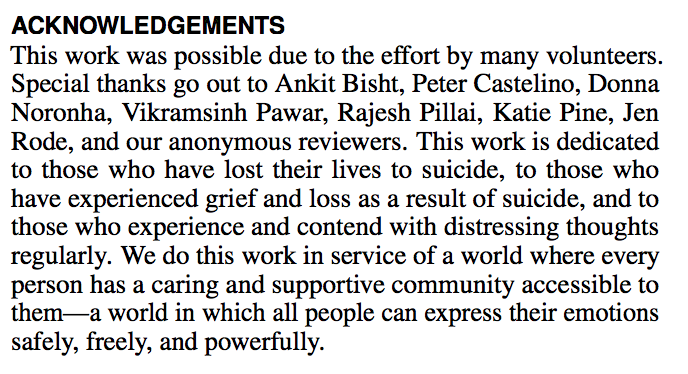In times when things feel bleak, you aren& #39;t able to leave your home, and formal mental health care is beyond your reach (either geographically or financially), mental health helplines can be an accessible way to find people who are willing to support you.
In India in particular, as a consequence of a variety of factors (including resource constraints, stigma, class, language), mental health helplines are one method that people use for support that is sensitive to their specific, often identity-based needs.
But who are the volunteers who (often invisibly) support people behind the lines? What are _their_ needs, and how do they leverage their experiences and identities to quickly and effectively support people who may no longer want to live?
In this work from #CHI2020, done with @faisalmlalani, @munmun10, @amt_shrma, and @nehakumar, we interviewed helpline volunteers in India to understand the different ways that volunteers help callers, and the implications for other tech-mediated mental health support systems.
You can read more about this #CHI2020 paper (done while I was a Research Fellow at @MSFTResearch in Bangalore) here! In this thread I highlight some of my favorite takeaways (including one light one that didn& #39;t make it to the paper). http://helplines.sachinpendse.in"> http://helplines.sachinpendse.in
(1) Repeat callers are often framed as "time-wasters" in Western health literature. In India, volunteers welcomed repeat callers. Callers would often call at the same time weekly to update volunteers on their progress, and volunteers were happy to know that callers were okay.
(2) In many cases, in the absence of accessible formal care, volunteers were tasked with connecting people (with severe suicidal ideation) to diverse forms of care as quickly as possible. This necessitated an intimate understanding of local contexts/resources.
(3) One light story --- in many cases, callers would initially pretend to have dialed the wrong number and then later (when comfortable) discuss their distress. For this reason, all helplines probed for emotional distress from anyone who called, even from telemarketers.
(3 cont.) These telemarketer callers were often taken aback at someone genuinely asking them how they were doing, would describe their distress, and call back later for more mental health support or sometimes even forget why they had called initially, now feeling supported.
(4) While technology may connect callers to help, the support that callers need is fundamentally human. Gender, class, language, and other identity-based factors were assets that volunteers leveraged to effectively help people who might not see any point in living any longer.
You can read more about this #CHI2020 work at the @MSFTResearch blog, which describes the role of this work towards the beginning steps of a centralized national mental health helpline for India. https://www.microsoft.com/en-us/research/blog/behind-the-phone-the-importance-of-human-connections-in-improving-mental-health-helpline-technology/?OCID=msr_blog_helpline_CHI_tw">https://www.microsoft.com/en-us/res...
On a final note, I want to extend acknowledgments to all the helpline volunteers that made this work possible, as well as my advisors and collaborators.
Have more questions about this work? Feel free to email me at sachin.r.pendse@gatech.edu :)

 Read on Twitter
Read on Twitter



